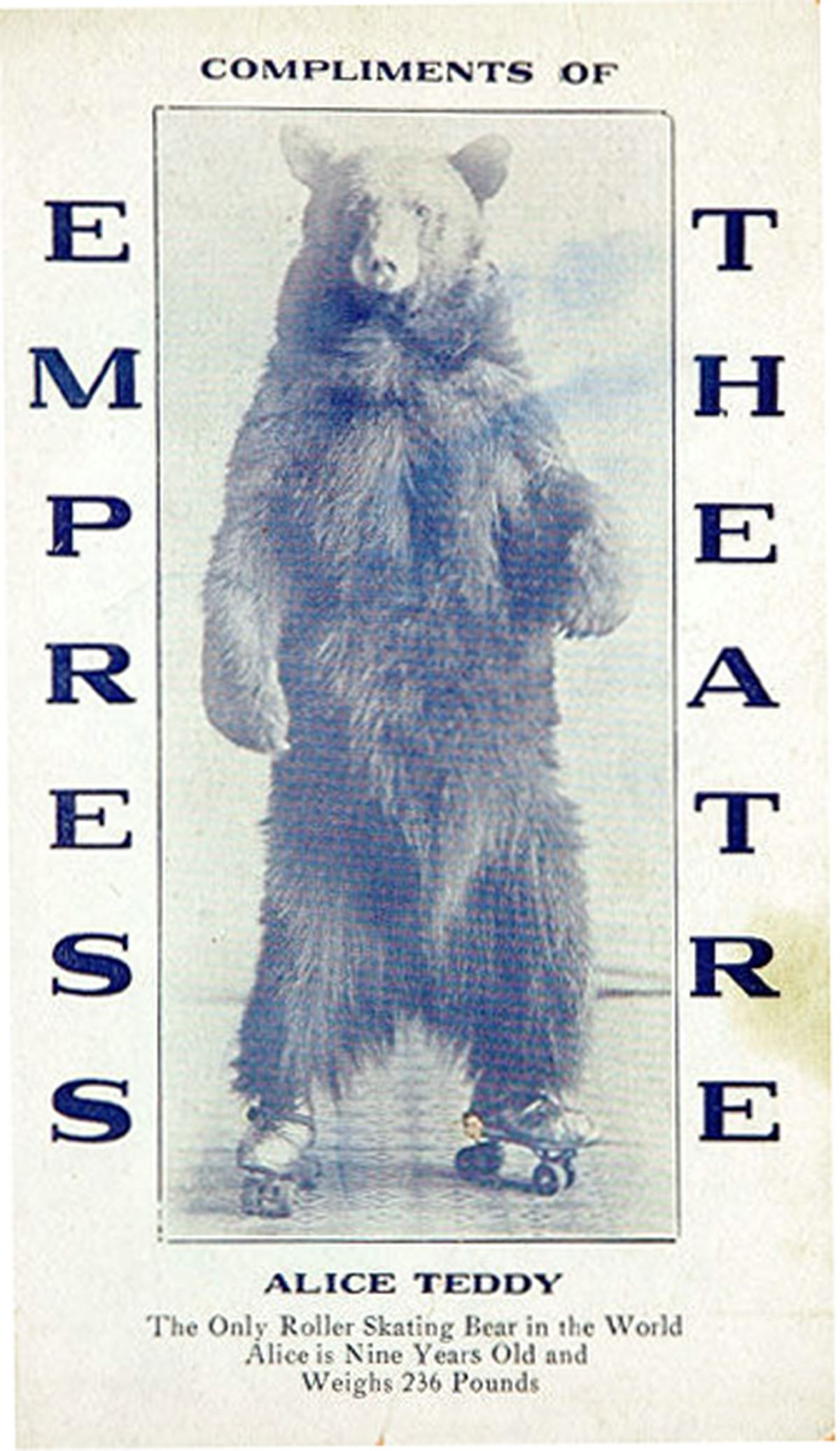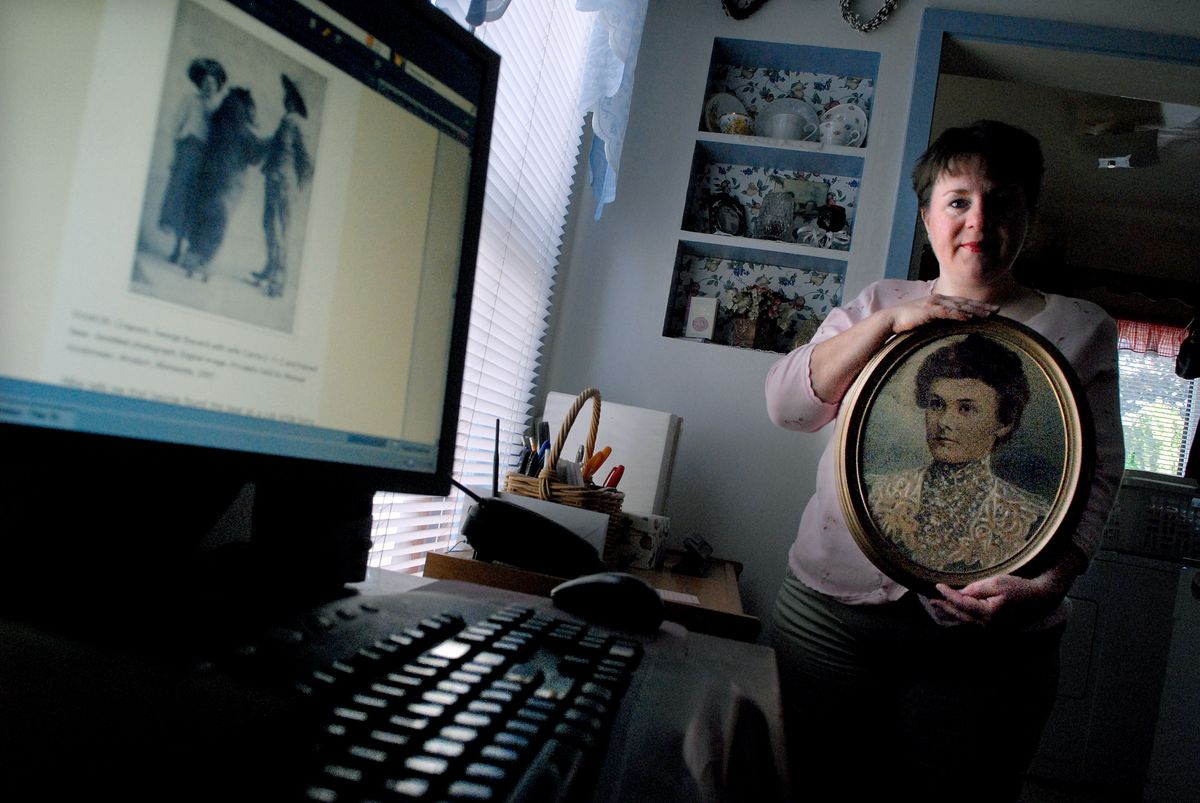FAMILY TIES
Google tools help geneaologist track roots
Miriam Midkiff’s genealogy research on Google helped her discover that a distant relative trained a bear to wear shoes and clothes, to walk upright and finally, after months of hard practice, to skate on ball-bearing rollers. Courtesy of Miriam Midkiff (Courtesy of Miriam Midkiff / The Spokesman-Review)
Spokane genealogist Miriam Midkiff crawls the Internet in search of family connections and historical tidbits. A member of the Eastern Washington Genealogical Society, Midkiff also teaches courses in genealogy at the Community Colleges of Spokane and for the Spokane County Library District.
Like other genealogists, Midkiff has collected scores of Web bookmarks for sites that contain historical records, family histories or census data. Midkiff typifies the wired and totally networked Web genealogist. She has become a master of following links and tracking sources until she finds what she’s looking for.
For Midkiff, one of regular resources is Google Book Search, the vast collection of more than 1 million public-domain books, pamphlets and diaries.
About a year ago Midkiff was hunting for information about a distant relative who lived in Minnesota. Midkiff posted some information about him on a Web site she uses to list her family tree.
A Midwest historian saw the comments about her relative, her great-great-great-great-uncle George Crapsey. He mailed her a photograph of Crapsey he’d found, showing her relative standing next to a bear wearing roller skates. Dated sometime around 1911, the photo caption said the bear was named Alice Teddy and that Crapsey toured with the animal across the world.
At that point she still didn’t have a lot of information about Crapsey or Alice Teddy. But then Midkiff plugged the name Alice Teddy into Google Book Search just to see what might come up.
While she used the basic Google search engine for some research, up to that point Midkiff had not made regular use of Google Book Search. But in this case it produced two citations for Alice Teddy. The big payoff was a 1918 pamphlet on the history of vaudeville. On page 257 was a short description of Alice Teddy, “the roller-skating bear” that also did lobby stunts.
“I expected Google Books to just have classic books that no longer had copyrights,” said Midkiff. “But instead I found pamphlets and old ephemera that you’d never think would be helpful in your family research.”
She then went back to Google and searched for more information. Eventually she came upon a 1911 newspaper article that read:
“When Crapsey returned home to Merrill, Wis., he brought Alice along. Her remarkable intelligence prompted him to spend his spare time in teaching Alice tricks. She readily learned to wear shoes, clothes, to walk upright and finally, after months of hard practice, to skate on ball-bearing rollers. Alice is the only bear in the world skating and dancing on skates.”
That extra information helped Midkiff add a human dimension to the history of her Minnesota relatives, she said.
After she posted her Alice Teddy discoveries on a her genealogy blog – at Ancestories1.blogspot .com – Google hired a film crew last winter in Spokane to produce a three-minute video about her use of Google Book Search. That video can be found on YouTube.
Midkiff also relies on the Google Alert service to send updates whenever a Web site adds information that fits keywords related to her research.
When any Google-tracked Web site adds a post with any of the words “Midkiff,” “Sweers,” “Tuinstra,” “Valk” or “Westaby,” Midkiff gets an automated e-mail with a link to that site. Those names are some of the more unusual ones in her and her husband’s ancestry.
Nine months of the year, Midkiff works as a staff support worker for special education staff at Garry Middle School in the Spokane School District. During the summers, she says she spends three or four hours a day doing research online and posting articles to her blog.
“The Internet has caused a huge surge in genealogy,” she said. For one thing, it’s made available huge troves of documents that used to be found inside libraries and government archives.
It’s also allowed genealogy researchers to stay in touch with each other and share ideas. Often, those ideas of others point the way to finding some hard-to-find information, she said.
“This is what makes genealogy so addicting,” she said. “You search and search for things like a detective, follow clues, and hopefully you end up with some fantastic results.”

